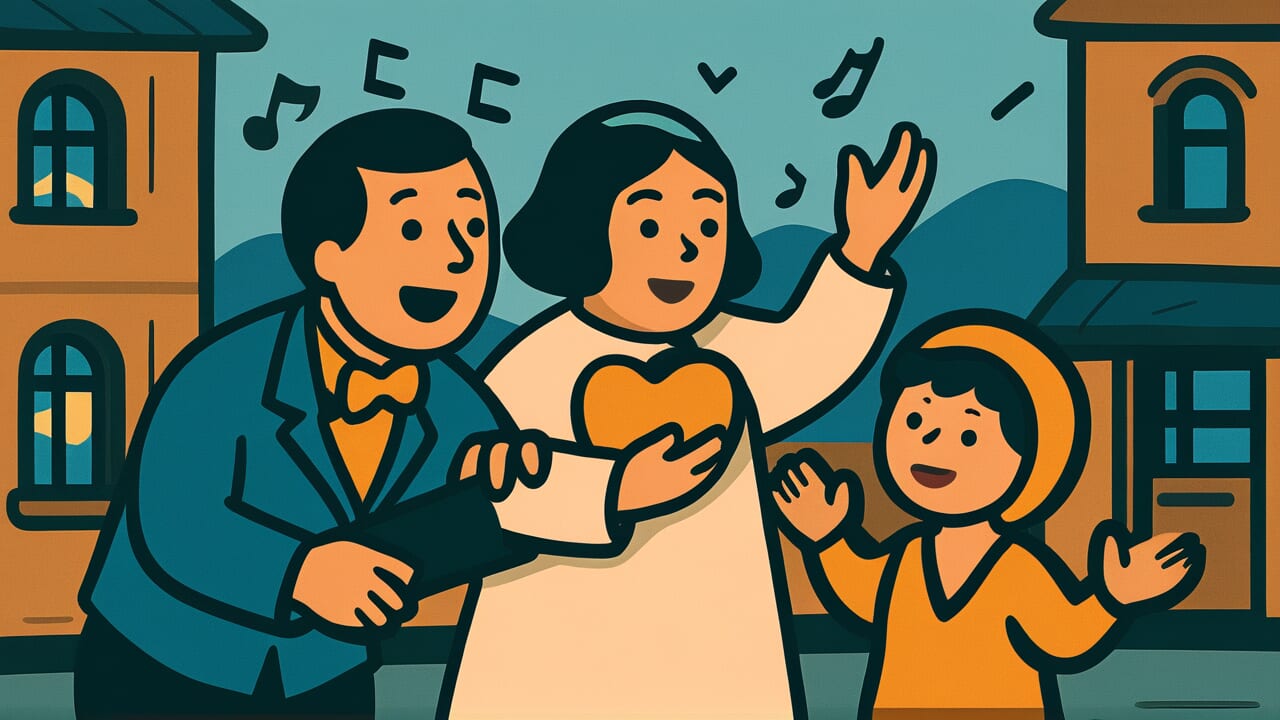How to Read “A poor man’s theft and a lover’s song”
hin no nusumi ni koi no uta
Meaning of “A poor man’s theft and a lover’s song”
“A poor man’s theft and a lover’s song” is a proverb that captures human nature. It shows how poverty drives people to steal, and love drives people to sing.
When urgent needs arise, people will do anything. This is the essence of being human.
People use this proverb when someone acts completely out of character. It helps us understand the desperate circumstances or strong motivations behind their actions.
Rather than simply condemning someone, it expresses deep human understanding. It says “something pushed them to that point.”
Even today, this proverb remains relevant. Some people face economic hardship and make unwilling choices. Others are driven by passion to take unexpected actions.
The proverb recognizes that humans don’t live by reason alone. We are moved by survival needs and emotional forces.
It asks us to set aside moral judgment for a moment. Instead, we should look at the root motivations behind human behavior.
Origin and Etymology
No clear records exist about when or where this proverb originated. However, its structure reveals something important about how it works.
It places two contrasting situations side by side to vividly express human behavior principles.
The pairing of “a poor man’s theft” and “a lover’s song” creates a fascinating contrast. Poverty is about survival and drives people to steal.
Love is about emotion and drives people to creative expression through song. These seem like completely different human activities.
Yet they share something crucial: both involve “acting out of necessity.” This common thread connects them.
Many proverbs based on human observation emerged during the Edo period. People of that time witnessed poverty-driven crimes and love-inspired poetry in their daily lives.
From such everyday observations, they developed wisdom about human nature. This proverb was likely born from those experiences.
The saying goes beyond moral judgments of right and wrong. It tries to capture the fundamental nature of human existence.
When cornered or driven by strong emotions, people do things they normally wouldn’t. This deep understanding of humanity has kept the proverb alive through the centuries.
Usage Examples
- I was shocked to hear he took money from the company, but when I learned his family faced huge medical bills, I thought of “A poor man’s theft and a lover’s song”
- When that serious person suddenly quit and went abroad, it was “A poor man’s theft and a lover’s song”—they must have been truly desperate
Universal Wisdom
“A poor man’s theft and a lover’s song” reveals the fundamental duality of human existence. We appear to live rationally and with planning.
But in reality, survival needs and emotional forces greatly influence us.
This proverb’s depth lies in how it views humans beyond good and evil. Theft is wrong, and songs are beautiful.
Yet both arise from “being driven by necessity.” This is the proverb’s key insight.
It warns against judging human behavior by superficial moral standards alone. We must look deeper.
When cornered, people reveal their true selves. Sometimes this is ugly, sometimes beautiful.
Poverty can drive someone to crime. Meanwhile, the surge of love can create magnificent art.
By placing these extremes side by side, the proverb asks a fundamental question: “What does it mean to be human?”
Our ancestors understood that human actions always have reasons. The reason might be a desperate need to survive.
Or it might be an explosion of uncontrollable emotion. Either way, people are beings driven to action by something.
With this understanding, we can deepen both our empathy for others and our self-awareness. We shouldn’t view humans one-dimensionally.
Instead, we should consider the circumstances behind their actions. This is why the proverb has been passed down for hundreds of years.
When AI Hears This
The human brain has a physical limit to its cognitive resources—the concentration and thinking power it can use at once.
Modern cognitive science shows that working memory, the brain’s workspace, is extremely limited. People in poverty must use most of this precious space to process survival questions.
“How will I get my next meal?” “How will I pay rent?” These concerns consume their mental capacity.
A Princeton University research team conducted an experiment. Simply imagining economic hardship caused subjects’ IQ test scores to drop by 13 points.
This decline equals the cognitive impairment from staying up all night or mild intoxication. Poverty doesn’t just mean “having no money.”
It actually robs the brain of processing power itself.
Writing a love song requires advanced cognitive processing. You must search for beautiful word combinations, abstract emotions, and arrange rhythm and meter.
But a brain facing survival crisis cannot spare resources for such leisurely processing. This isn’t just about Maslow’s hierarchy—that lower needs must be met before higher ones activate.
The brain’s processing capacity is physically seized, making cultural activities impossible. This is a concrete, measurable phenomenon.
This proverb accurately observed the mechanism by which poverty steals human creativity. And it did so in an era before brain science even existed.
Lessons for Today
This proverb teaches modern people an important lesson. To understand someone, we must look beyond surface actions to the circumstances behind them.
When someone takes an unexpected action, don’t criticize immediately. Instead, ask yourself: “What pushed this person to this point?”
Economic hardship, mental anguish, or irrepressible passion—people have urgent circumstances invisible from the outside.
At the same time, this proverb helps us understand ourselves. When you feel driven to impulsive action, some “necessity” might be pushing you.
By identifying what that necessity is, you can make more constructive choices.
Modern society is complex. Everyone carries some kind of pressure.
Use this proverb’s wisdom to deepen empathy for others and self-understanding. People aren’t perfect.
But by understanding each other’s imperfections, we can create a warmer society.



Comments